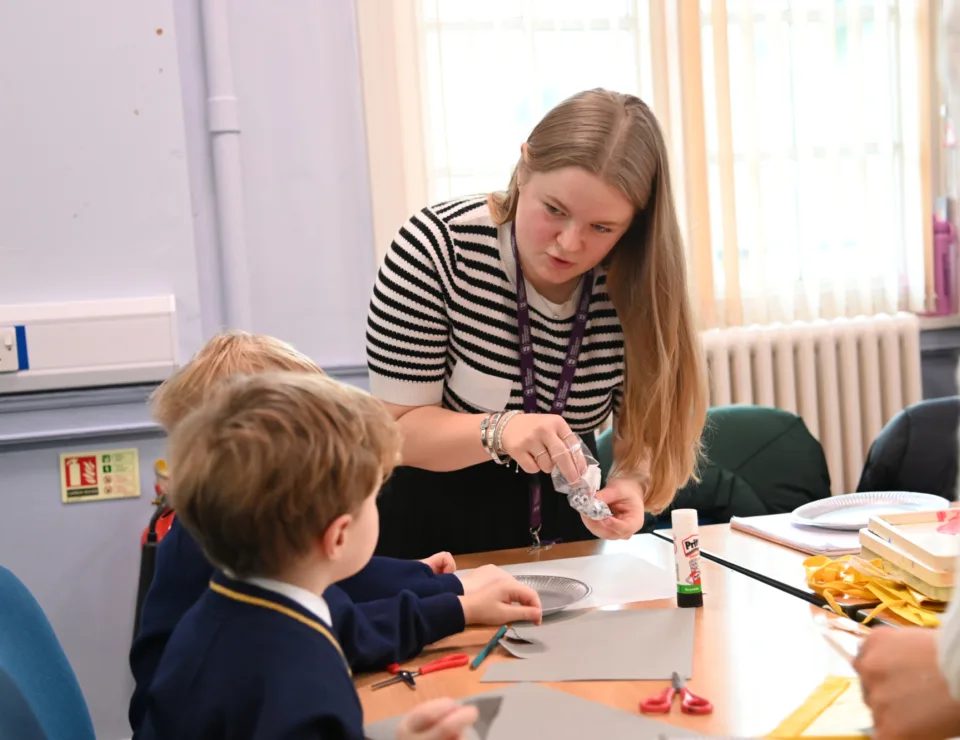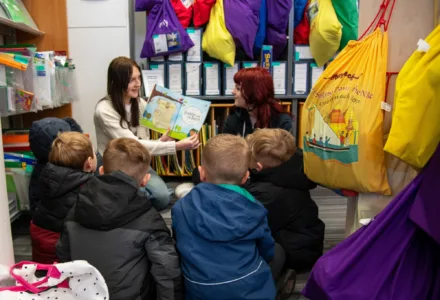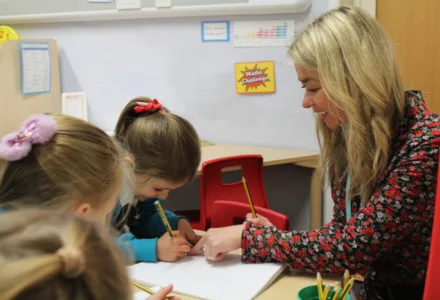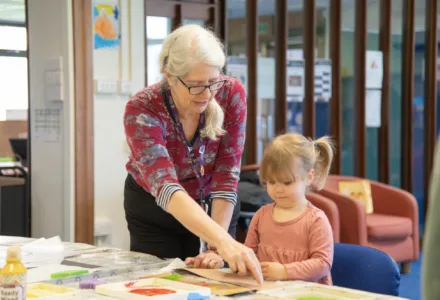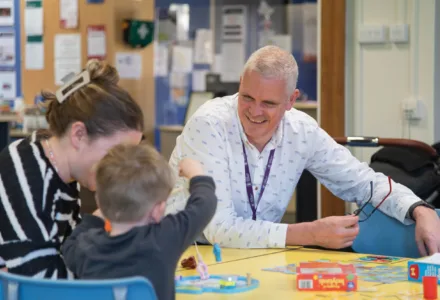Why study this course
Continue working or volunteering while pursuing your degree, providing you with valuable practical experience alongside your academic studies
The National Student Survey in 2025 revealed satisfaction rate of 98.88% among students in professional studies programmes, highlighting quality and effectiveness
Blended Learning Delivery: Small number of days on campus and remote face-to-face live sessions.
Offers the opportunity to work towards meeting the Department for Education's Full and Relevancy Criteria, providing a clear path to meeting professional standards in early childhood education
Course summary
Have you ever thought about working towards a degree, but decided against it as you are already in employment or volunteering and don’t want to give that up? Our FdA Early Childhood Education course is designed for those working or volunteering with children 0-8 years in the voluntary, private and independent early years sector or a foundation unit in a school. This course is also for nannies, child minders and those working in Children’s Centres with families of young children.
Key facts
|
Award |
FdA |
|---|---|
|
UCAS code |
LX40 |
|
Duration |
2 years |
|
Mode of study |
Full time, Blended |
|
Start date |
September 2026 |
|
Award |
Lincoln Bishop University |
|
Institution code |
B38 |
Apply for this course
When you're ready to apply, the route you take will depend on your personal circumstances and preferred method of study. Click the relevant button below to start your application journey.
About this course
The Foundation Degree is a blended, work-based programme that combines practical learning with live online teaching and occasional campus sessions. You will attend online classes twice a week in real time, with five in-person teaching days across the academic year, making it possible to continue working or volunteering while you study.
Over the two-year programme, you will build on your existing experience of working with young children and apply it to your studies. In your first year, you will gain an introduction to studying at university level, explore how children learn, and examine how your practice supports the needs of children. You will also reflect on your role within the early years sector to support your professional development, while studying key topics such as child development and social interactions to strengthen your practical knowledge.
In your second year, you will explore important topics such as inclusion, equality, and diversity, as well as how to support the development and learning of young children. You will also learn about different approaches to teaching (pedagogy) and how to reflect on your own practice.
During the two-year programme, you will also have opportunities to work alongside students from related courses, such as those based in schools or youth work. This collaboration will help you broaden your understanding of working with learners across a range of ages and settings and strengthen your future career prospects.
Throughout the programme, the Foundation Degree in Early Childhood Education meets the full and relevant criteria set by the Department for Education, as well as the Graduate Competency requirements of the Early Childhood Studies Degree Network. This means that, after successfully completing the BA (Hons) Early Childhood Education (with Graduate Practitioner), students have the opportunity to gain a recognised professional accreditation within the early years sector.
Students may also choose to progress onto the BA (Hons) Early Childhood Education without the Graduate Practitioner option. This route still meets the full and relevant criteria set by the Department for Education. In addition, there are pathways into teaching, including the opportunity to complete a top-up course in Primary Teaching Studies with Qualified Teacher Status (QTS).
What you will study
Students on this course currently study some or all of the following modules:
This module provides an induction to higher education and supports the development of academic literacies. The underpinning foundations for professional learning are the focus of ‘Tools for Learning’ including reflection. The module also introduces well–established traditional and contemporary learning theories in relation to higher education and supporting children and young people’s development.
The module will include an induction to the range of learning resources available to facilitate the development of higher education academic literacy skills.
You will practice and develop your study skills, and you will evaluate and reflect on your personal learning and professional practice. You will consider the tools and principles relating to supporting your own and others learning development and achievement.
This module introduces you to key philosophies, concepts, policies, and forms of provision that underpin educational practice. It provides a historical and contemporary overview of education and social provision, enabling you to critically explore how different educational and social philosophies, policies, and legislative frameworks influence practice across diverse settings.
You will engage with the work of key thinkers and social reformers, examining how these ideas continue to shape provision for children, young people, and families.
Through reflection on your own practice contexts and comparison across different sectors, you will begin to understand and articulate the relationship between theory, policy, and everyday professional practice.
Although developmental theories of education and learning are used throughout the programme, this module ensures you have a secure grounding in a range of perspectives to enable exploration of theories, principles and policy relating to the development of the individual in society. The module explores the influencing factors on development and how children and young people may be supported. The module enables you to evaluate the impact of development and will include a range of theories and perspectives based in sociology and psychology. There will be opportunities to develop the understanding gained in prior learning of how development can impact on children and young people’s learning. The module introduces you to contemporary concepts and principles of supporting children and young people in a range of practice settings.
This module introduces you to the concept of working together in practice, with a focus on how professionals collaborate to support children, young people and families. You will explore what effective collaborative practice looks like within teams and when working with other organisations such as education, health, social care and community services.
The module considers both the benefits and challenges of working with others to safeguard children and young people, promote well-being and support positive behaviour. You will examine legislation and guidance, reflect on your own workplace experiences and consider how collaborative working can either support or create difficulties within professional environments.
This module provides an in-depth exploration of equality, diversity, and inclusion, supporting you to critically engage with a wide range of theories and models that underpin inclusive practice across educational and care settings. While inclusive practice is embedded throughout the programme, this module offers a dedicated opportunity for you to deepen your understanding and apply theory to address complex societal inequalities.
Building on foundational knowledge from year one, you will extend your appreciation of how socio-political factors, inequality and power influence participation. You will examine your own values and beliefs in relation to equality, diversity and inclusion and consider how these may affect yours, and others, professional behaviours
This practice-based module is designed to enable you to explore your professional practice working with children, young people and/or families. This module is concerned with ensuring the continued success and quality of provision within the education, early childhood and youth sectors.
The key aspects of quality, effectiveness and success are dependent upon a workforce who is reflective, competent and skilled within their subject specific areas. The overall aim of this module is for you to gain a practical and theoretical understanding of the importance of reflection, particularly in challenging personal and professional practice.
This module will also analyse principles of practice including competence frameworks, which aims to support you to develop your capacity to engage in informed, constructive reflection.
This module explores the theoretical and practical foundations of supporting learning and assessment within early childhood educational settings. It integrates key themes from both pedagogy and assessment, offering you the opportunity to develop professional knowledge and skills that reflect contemporary practice and debates. You will critically examine pedagogical approaches and assessment strategies, and their application to practice.
This module supports you to consider how to adapt and differentiate support and assessment practices in response to complex needs and within a range different learning environments, also exploring the adult’s role within play, sustained shared thinking and responsive interactions. The significance of working in partnership with parents, carers, and other professionals will be a key focus. You will explore the importance of key transition points in early childhood and the role of assessment in supporting smooth and emotionally secure transitions.
The Practitioner Research module provides you with the opportunity to design a research project. You will be introduced to the broad principles of research design, by engaging with the process of a literature review, you will develop subject knowledge pertinent to the area of inquiry. Ethical issues will be addressed, including the key principles of informed consent, anonymity and confidentiality. You will be introduced to a range of data collection methods and techniques for analysing and presenting research findings and this will be supported through lectures. You will expected to collect primary data from your fellow students within the class, and will then be guided to write up specific elements of your project for the assessments.
Entry requirements
- Typically, a minimum of one year’s experience in practice.
- Minimum of two days a week (minimum of 12 hours per week accumulating to 360 hours per year of study in a relevant role, either as an employee or a volunteer).
- Typically a Level 3 Diploma, NVQs, access to HE programmes, subject/vocational qualifications.
- Written support from the head teacher/workplace manager in which the applicant works or volunteers.
Further information
In accordance with University conditions, students are entitled to apply for Recognition of Prior Learning, RP(C)L, based on relevant credit at another HE institution or credit Awarded for Experiential Learning, (RP(E)L).
How you will be taught
This work-focused degree is a combination of practice-based learning and campus-based sessions which run for two evenings a week, so that you are able to continue in employment throughout the course. The degree is designed to improve and develop your personal and professional communication skills, allows you to professionalise your approach and further your personal growth.
You will work with a range of experienced academic staff and be supported through peer-led groups, directed tasks and interactive web-based resources.
Academic staff
Assessment
Typically, a variety of assessment methods are used including presentations, discussions, debates, poster presentations, essays, portfolios of work, case studies and reflections. All assessments allow you to reflect on your practice and theory as you evidence your learning, building on your personal strengths to develop clear communication skills to share your knowledge and understanding.
Careers & Further study
Many of our students in this programme are employed as Teaching Assistants, early years practitioners, nannies, and childminders. They actively contribute to educational outcomes for children, playing pivotal roles in facilitating informal and formal learning opportunities. This includes providing targeted support to children with specific needs, making a tangible difference in their development. Our Foundation Degree is widely recognised as a stepping stone towards a teaching career, enabling you to progress within your role as a Teaching Assistant or early years practitioner. Additionally, it opens doors to explore senior positions in the sector. Moreover, this programme offers several top-up degree options, empowering you to pursue your long-term goals in the field of child education.
What Our Students Say
Discover what life is like at Lincoln Bishop University from our students.
Fees & Funding
A lot of student finance information is available from numerous sources, but it is sometimes confusing and contradictory. That’s why at Lincoln Bishop we try to give you all the information and support we can to help to throughout the process. Our Student Advice team are experts in helping you sort out the funding arrangements for your studies, offering a range of services to guide you through all aspects of student finance step by step.
Undergraduate course applicants should apply via UCAS using the relevant UCAS code. For 2026 entry, the application fee is £28.95, and you can make a maximum of 5 choices.
For the 2025 cycle, UCAS is removing the undergraduate application fee for any student who is/or has received Free School Meals (FSM) during the last six years, up until the end of their final year at school or college. More information on the UCAS fee waiver can be found here.
For all applicants, there are full instructions at UCAS to make it as easy as possible for you to fill in your online application, plus help text where appropriate. Full details of all tuition fees can be found here.
Ethical considerations of doctoral methodologies Podcast
Dr Nyree Nicholson is a Programme Leader on our work-based Foundation Degree programmes. The title of her doctoral research was “Supporting children with identified speech, language and communication needs at two-years-old: voices of early years practitioners”. Nyree utilised a narrative hermeneutic methodology with conversational interviews to explore the lived experiences of fifteen early years practitioners.
Samantha Hoyes is a senior lecturer in Early Childhood Studies and is currently part way through her PhD. Her focus is on working motherhood in the 21st Century and how working mothers make sense of their identities. Applying a post-structuralist feminist approach, Sam has utilised photo elicitation interviews to explore working mothers lived experiences. Sam's sample will consist of 10-15 working mothers living in Lincolnshire with a child/ children aged 0-5 years at the time of data collection. She is currently around halfway through her initial data collection.
In this podcast, Nyree and Sam discuss the methodological approaches taken in the research process and share the ethical considerations they encountered throughout the research process.
For any more question or queries please contact Samantha.hoyes@lincolnbishop.ac.uk and nyree-anne.nicholson@lincolnbishop.ac.uk
